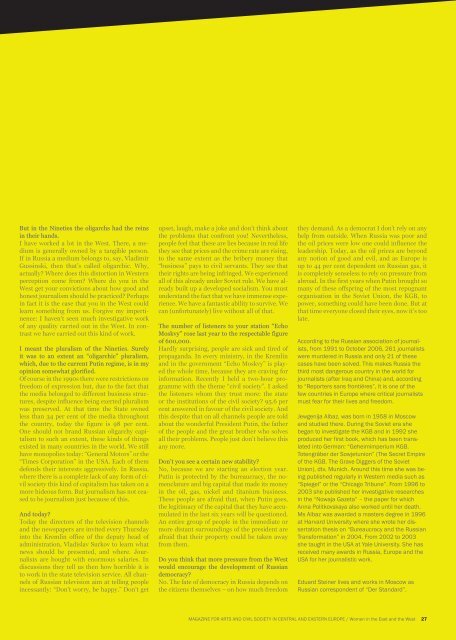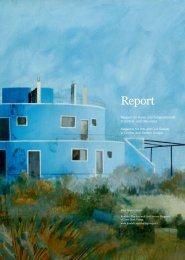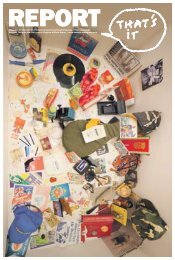You also want an ePaper? Increase the reach of your titles
YUMPU automatically turns print PDFs into web optimized ePapers that Google loves.
But in the Nineties the oligarchs had the reins<br />
in their hands.<br />
I have worked a lot in the West. There, a medium<br />
is generally owned by a tangible person.<br />
If in Russia a medium belongs to, say, Vladimir<br />
Gussinski, then that’s called oligarchic. Why,<br />
actually? Where does this distortion in Western<br />
perception come from? Where do you in the<br />
West get your convictions about how good and<br />
honest journalism should be practiced? Perhaps<br />
in fact it is the case that you in the West could<br />
learn something from us. Forgive my impertinence:<br />
I haven’t seen much investigative work<br />
of any quality carried out in the West. In contrast<br />
we have carried out this kind of work.<br />
I meant the pluralism of the Nineties. Surely<br />
it was to an extent an “oligarchic” pluralism,<br />
which, due to the current Putin regime, is in my<br />
opinion somewhat glorified.<br />
Of course in the 1990s there were restrictions on<br />
freedom of expression but, due to the fact that<br />
the media belonged to different business structures,<br />
despite influence being exerted pluralism<br />
was preserved. At that time the State owned<br />
less than 34 per cent of the media throughout<br />
the country, today the figure is 98 per cent.<br />
One should not brand Russian oligarchy capitalism<br />
to such an extent, these kinds of things<br />
existed in many countries in the world. We still<br />
have monopolies today: “General Motors” or the<br />
“Times Corporation” in the USA. Each of them<br />
defends their interests aggressively. In Russia,<br />
where there is a complete lack of any form of civil<br />
society this kind of capitalism has taken on a<br />
more hideous form. But journalism has not ceased<br />
to be journalism just because of this.<br />
And today?<br />
Today the directors of the television channels<br />
and the newspapers are invited every Thursday<br />
into the Kremlin office of the deputy head of<br />
administration, Vladislav Surkov to learn what<br />
news should be presented, and where. Journalists<br />
are bought with enormous salaries. In<br />
discussions they tell us then how horrible it is<br />
to work in the state television service. All channels<br />
of Russian television aim at telling people<br />
incessantly: “Don’t worry, be happy.” Don’t get<br />
upset, laugh, make a joke and don’t think about<br />
the problems that confront you! Nevertheless,<br />
people feel that these are lies because in real life<br />
they see that prices and the crime rate are rising,<br />
to the same extent as the bribery money that<br />
“business” pays to civil servants. They see that<br />
their rights are being infringed. We experienced<br />
all of this already under Soviet rule. We have already<br />
built up a developed socialism. You must<br />
understand the fact that we have immense experience.<br />
We have a fantastic ability to survive. We<br />
can (unfortunately) live without all of that.<br />
The number of listeners to your station “Echo<br />
Moskvy” rose last year to the respectable figure<br />
of 600,000.<br />
Hardly surprising, people are sick and tired of<br />
propaganda. In every ministry, in the Kremlin<br />
and in the government “Echo Moskvy” is played<br />
the whole time, because they are craving for<br />
information. Recently I held a two-hour programme<br />
with the theme “civil society”. I asked<br />
the listeners whom they trust more: the state<br />
or the institutions of the civil society? 95.6 per<br />
cent answered in favour of the civil society. And<br />
this despite that on all channels people are told<br />
about the wonderful President Putin, the father<br />
of the people and the great brother who solves<br />
all their problems. People just don’t believe this<br />
any more.<br />
Don’t you see a certain new stability?<br />
No, because we are starting an election year.<br />
Putin is protected by the bureaucracy, the nomenclature<br />
and big capital that made its money<br />
in the oil, gas, nickel and titanium business.<br />
These people are afraid that, when Putin goes,<br />
the legitimacy of the capital that they have accumulated<br />
in the last six years will be questioned.<br />
An entire group of people in the immediate or<br />
more distant surroundings of the president are<br />
afraid that their property could be taken away<br />
from them.<br />
Do you think that more pressure from the West<br />
would encourage the development of Russian<br />
democracy?<br />
No. The fate of democracy in Russia depends on<br />
the citizens themselves – on how much freedom<br />
they demand. As a democrat I don’t rely on any<br />
help from outside. When Russia was poor and<br />
the oil prices were low one could influence the<br />
leadership. Today, as the oil prices are beyond<br />
any notion of good and evil, and as Europe is<br />
up to 44 per cent dependent on Russian gas, it<br />
is completely senseless to rely on pressure from<br />
abroad. In the first years when Putin brought so<br />
many of these offspring of the most repugnant<br />
organisation in the Soviet Union, the KGB, to<br />
power, something could have been done. But at<br />
that time everyone closed their eyes, now it’s too<br />
late.<br />
According to the Russian association of journalists,<br />
from 1991 to October 2006, 261 journalists<br />
were murdered in Russia and only 21 of these<br />
cases have been solved. This makes Russia the<br />
third most dangerous country in the world for<br />
journalists (after Iraq and China) and, according<br />
to “Reporters sans frontiéres”, it is one of the<br />
few countries in Europe where critical journalists<br />
must fear for their lives and freedom.<br />
Jewgenija Albaz, was born in 1958 in Moscow<br />
and studied there. During the Soviet era she<br />
began to investigate the KGB and in 1992 she<br />
produced her first book, which has been translated<br />
into German: “Geheimimperium KGB.<br />
Totengräber der Sowjetunion” (The Secret Empire<br />
of the KGB. The Grave Diggers of the Soviet<br />
Union), dtv, Munich. Around this time she was being<br />
published regularly in Western media such as<br />
“Spiegel” or the “Chicago Tribune”. From 1996 to<br />
2003 she published her investigative researches<br />
in the “Nowaja Gazeta” – the paper for which<br />
Anna Politkovskaya also worked until her death.<br />
Ms Albaz was awarded a masters degree in 1996<br />
at Harvard University where she wrote her dissertation<br />
thesis on “Bureaucracy and the Russian<br />
Transformation” in 2004. From 2002 to 2003<br />
she taught in the USA at Yale University. She has<br />
received many awards in Russia, Europe and the<br />
USA for her journalistic work.<br />
Eduard Steiner lives and works in Moscow as<br />
Russian correspondent of “Der Standard”.<br />
MAGAZINE FOR ARTS AND CIVIL SOCIETY IN CENTRAL AND EASTERN EUROPE / Women in the East and the West 27




